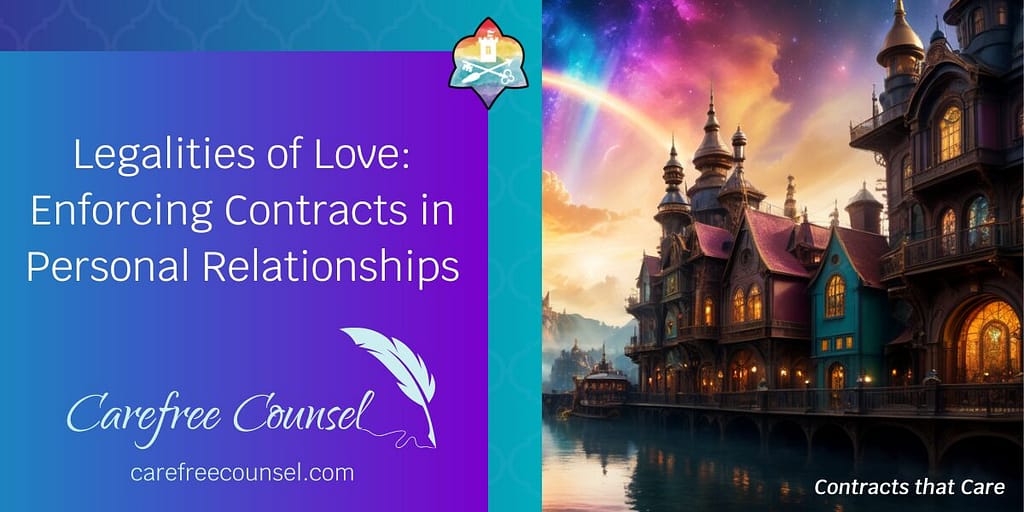
Did you know that contracts made within a domestic relationship are presumed not to be enforceable? This makes a lot of sense. If you promise your son he can have the car to go out on Friday night if he takes out the garbage all week, and he fulfils his part of the bargain, but by the time Friday night comes around your plans have changed and the car is needed elsewhere, you don’t want him able to take you to court, right? The sulking is going to be bad enough!
Is that entirely a good thing?
What about where an elderly parent loans a large sum of money to one of their children, on the condition that it is paid back within a certain amount of time, and then the parent passes away? Situations like this can cause all-out-war between siblings!
Or how about when a girl goes around taking professional photos and videos of her boyfriend’s band, on the understanding that they will acknowledge her as the photographer, but they never do… and then he dumps her… but her work is still all over their Facebook page, selling their albums for them?
When you enter into an agreement like this, no-one ever wants to think about the potential for things to go wrong. Everyone loves each other and trusts in good intentions, so why would you want to wrap that up in the barbed wire of a contract?
So what can you do to protect yourself & those you love?
It is important to get really clear on what your intentions are from the start, to decide how important it is for you and the other person to ensure that the obligations and responsibilities being entered into are fulfilled. Think about who else might potentially be affected by the agreement and what the consequences for them might be if something goes wrong. A contract does not have to be sharp and spiky – it can be a loving and considerate way to make sure that if things don’t work out the way everyone hopes they will, the rights and obligations that are important to you both, and to others, are protected.
In situations like those described above, which are real matters I am currently dealing with, when the relationship deteriorates and there is no written evidence (except a pile of emails and texts that may or may not clearly set out the terms of the agreement) everything is confusion, hurt feelings and argument. If they had just taken the time to clearly think about their agreement and record the details in writing, a lot of later suffering could have been avoided.
It is important to note in this context that the presumption regarding lack of legal enforceability can be rebutted by clearly stating that it is your intention to enter into an enforceable agreement.
Here’s how to DIY
1. Identify the important people in the agreement. Put down your names and addresses and make sure they are correct. Note that a contract can only bind the people who sign it / explicitly agree to it… so take the example of the girl and the band – if she and her boyfriend agree, that is great, but the rest of the band members aren’t legally bound by it unless they also agree.
2. Briefly set out the relationship between the people involved and how they are related to each other whether by family ties or choice.
3. Clearly and comprehensively set out the terms of the agreement. Who does what? Who gets what in return? How, when and where is it to be given? The more details you provide, the more clarity and certainty everyone has, the less likely things are to go wrong, and the easier it will be to point to the contract if they do.
4. Come up with a plan for what you will do if things do go wrong. When does the agreement end? What happens if one or the other people can’t do what they have promised to?
5. If you are in a domestic relationship, do you want to be able to hold the other person to their agreement in a worst case scenario? Are you willing to be held to your part in the agreement? If so, clearly state that is your intention (but also think about other options for resolving a dispute, such as promising to talk about it or try mediation with an accredited mediator before going to court!)
Those are the bare bones. A lawyer will generally put other stuff in there about dispute resolution mechanisms and governing law which are good to have if things go really wrong, but so long as you have covered those four points, you have the bones of a workable contract that is going to be a lot better than nothing if things don’t work out as planned.
The final thing I want to point out is that in many cases contracts PREVENT litigation! The reason the matters described above might end up in court is because there is so much confusion and argument around what was actually agreed to. If these people had taken the time to sit down together while they were all still friends trying to help each other out, set out clearly what they were agreeing to, and given some thought to potential future problems, they could simply point to the contract.
How I can help
A contract not only sets the loving boundaries that hold space for a relationship to function with clarity and certainty – it can also be a force field to contain (in the sense of limit) the damage that occurs if the relationship unfortunately explodes. If you would like help with your contract or advice on a situation like this, you can book a free 30 minute consultation with me to discuss what you might need.

